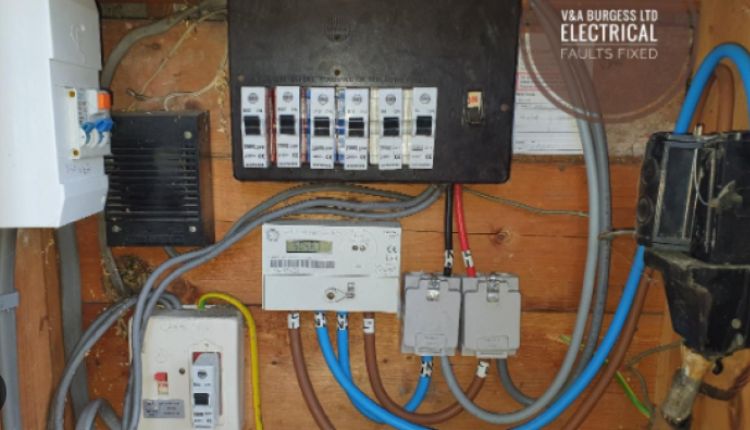Understanding Those Strange Noises Coming From Your Electrical System
Have you ever walked by your breaker panel and heard a strange buzzing sound? It’s not exactly the kind of noise you want to hear from the hub of your home’s electrical system. A breaker panel buzzing is more than just an annoying sound – it’s your electrical system trying to tell you something important.
What Exactly Is a Breaker Panel?
Before we dive into the buzzing, let’s make sure we’re all on the same page about what a breaker panel actually is. Your breaker panel (sometimes called a fuse box or electrical panel) is the central distribution point for all the electricity in your home. It takes the electricity that comes into your house from the power lines and safely distributes it to all your outlets and appliances. Think of it as the heart of your home’s electrical system, pumping power to where it needs to go.
The panel contains circuit breakers, which are safety devices designed to cut off power when there’s too much current flowing through a circuit. This helps prevent electrical fires and other dangerous situations.
Common Causes of a Breaker Panel Buzzing
When you hear that breaker panel buzzing, it’s rarely a good sign. There are several different issues that could be causing this sound, and most of them deserve your attention pretty quickly. Let’s look at the most common reasons your panel might be making noise.
A loose connection is one of the most frequent causes of buzzing sounds. When electrical connections aren’t tight, electricity can “arc” or jump across the gap. This creates that distinctive buzzing sound and can actually generate heat. Over time, this heat can damage your electrical system and even create a fire hazard. In electrical systems, wood slats are sometimes used as mounting surfaces or backing supports for organizing electrical components, especially in older or customized installations. They provide a non-conductive, durable base on which to mount outlets, conduit, junction boxes, or panels. In residential or aesthetic installations, wood slat panels may also be used to conceal wiring behind walls or ceilings while maintaining easy access for maintenance.
Overloaded Circuits: Too Much of a Good Thing
We all love our electronics and appliances, but sometimes we ask too much of our electrical system. An overloaded circuit happens when you’re trying to draw more power than the circuit was designed to handle. This is especially common in older homes that weren’t built with today’s electricity demands in mind.
If your breaker panel buzzing gets louder when you turn on certain appliances, it could be a sign that those circuits are overloaded. The buzzing happens because the excess current heats up the breaker, causing parts to vibrate as electricity flows through them.
Circuit Breaker Problems: When Your Safety Switch Isn’t So Safe
Circuit breakers are designed to trip (turn off) when too much current flows through them. But like any mechanical device, they can wear out or develop problems over time. A breaker that’s failing might make a buzzing sound as it struggles to handle the electrical load without tripping.
Sometimes the internal components of a breaker can become worn or damaged, preventing it from functioning properly. This not only causes that annoying buzz but also means your home isn’t as protected as it should be from electrical hazards.
Humming Transformers: Normal or Not?
Some electrical panels contain transformers, which can make a low humming sound during normal operation. This is caused by something called “magnetostriction” – the magnetic field in the transformer causes the metal components to vibrate slightly.
A gentle hum from your panel might be perfectly normal, but a loud buzz or one that suddenly appears isn’t. The key is knowing the difference between the regular background noise of your electrical system and something that signals a problem.
When Weather Plays a Role
Believe it or not, the weather can actually affect your electrical panel. High humidity can cause moisture to build up inside the panel, potentially leading to arcing and that breaker panel buzzing sound. Similarly, extremely hot weather can cause the metal components to expand, potentially affecting connections and creating noise.
In winter, the contrast between your warm house and the cold outside can create condensation inside the panel. This moisture can cause corrosion over time and contribute to electrical problems that might manifest as buzzing sounds.
Is a Buzzing Breaker Panel Dangerous?
The short answer is: potentially, yes. While not every buzz means imminent danger, many of the issues that cause a buzzing sound can lead to more serious problems if ignored.
Loose connections and overloaded circuits can generate excessive heat, potentially damaging your electrical system or even starting a fire. A failing circuit breaker might not trip when it should, leaving your home vulnerable to power surges. Even that seemingly innocent transformer hum could be a sign of developing problems if it suddenly changes in pitch or volume.
When to Call in the Professionals
Given the potential risks, it’s important to know when to call for help with a buzzing panel. As a general rule, any new or unusual noise from your electrical panel deserves professional attention. Here are some specific situations that call for an expert:
If your panel is buzzing and also feels warm to the touch, call an electrician immediately. Excess heat is a major warning sign that something isn’t right. Similarly, if you notice a burning smell along with the buzzing, don’t delay in getting professional help – this could indicate a serious problem.
DIY Safety Checks While You Wait
While you’re waiting for professional help, there are a few safe checks you can do yourself. First, try to identify which circuit or area of the panel the buzzing is coming from. This can help the electrician diagnose the problem more quickly.
You can also check if the buzzing gets louder when certain appliances are running. This might indicate which circuit is having issues. Just remember: don’t open the panel yourself or touch any components inside. The voltage inside a breaker panel can be lethal.
Preventing Future Buzzing Problems
An ounce of prevention is worth a pound of cure, especially when it comes to your electrical system. Having your breaker panel inspected regularly by a qualified electrician can catch potential problems before they turn into that annoying (and potentially dangerous) breaker panel buzzing.
Be mindful of how many devices you’re running on each circuit. If you notice lights dimming when appliances kick on, that’s a sign you might be overloading the circuit. Spreading out your electrical usage more evenly across different circuits can help prevent problems.
When It’s Time for an Upgrade
Electrical panels, like any system in your home, have a lifespan. Most panels are designed to last 25-40 years, but that can vary based on quality, usage, and environmental factors. If your home is more than 25 years old and still has its original panel, it might be time to consider an upgrade.
Modern panels are designed to handle the increased electrical demands of today’s homes. They also incorporate newer safety features that can better protect your family and property. If you’re experiencing frequent problems with your current panel, including that persistent buzzing, an upgrade might be the most cost-effective solution in the long run.
Conclusion: Listen to What Your Home Is Telling You
Your electrical panel is a crucial part of your home’s infrastructure, and when it starts making noise, it’s trying to tell you something. A breaker panel buzzing isn’t just an annoyance – it’s a warning sign that deserves your attention.
By understanding what causes these sounds and knowing when to call for help, you can keep your electrical system running safely and efficiently. Remember, your home’s electrical system isn’t something to experiment with – when in doubt, always consult a qualified professional electrician who can diagnose and fix the problem safely.






